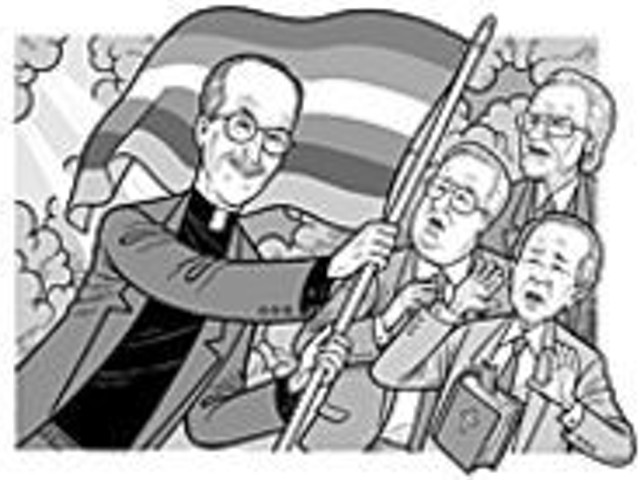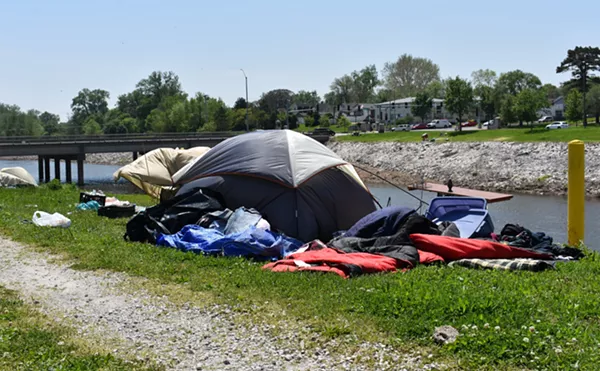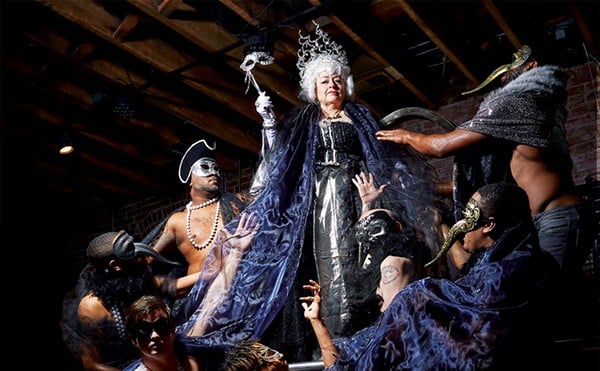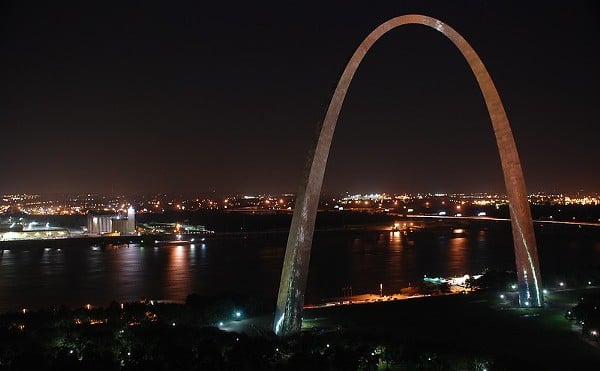A highly successful workers' compensation attorney who is now at a white-capped 75 years, Randall is a mule-stubborn smart-ass who collects and rehabilitates century-old relics of architectural elegance -- including the Randall Gallery on 13th Street and the Gill Building on the corner of 7th and Olive streets -- much like other men of a certain age and station collect sports cars and younger women who are not their wives.
"My wife always says, 'I wish you'd get a mistress -- it'd be cheaper,'" he quips.
Lately, the city has graphically illustrated just how costly his particular brand of pleasure chasing can be.
Slapped with an emergency condemnation order from Building Commissioner Ron Smith two months ago, Randall and his wife, Pearl, were forced to leave their three-story apartment in the building for their country place in Litchfield, Ill.
The order also shut down the Thai restaurant in the basement of the building -- Sen, a budding favorite with both the daytime lunch crowd, such as it is, and the hip loftinistas who haunt the deserted canyons of downtown. Sen's owner, Suthiporn "Art" Chandawanich has watched his American dream -- and his American greenbacks -- disappear and is thinking about going back to Thailand to do anything but start another restaurant.
Now, condemnations are the blunt-force trauma of any city's building code. They invoke all manner of dilapidated and abandoned imagery -- rats as big as elephants, crumbling walls, rotten timbers, broken and boarded-up windows, empty rooms, crack pipes.
Must be a bad building Jack Randall owns.
Even worse -- the emergency condemnation designation. That's usually reserved for the most dire circumstances: a building in imminent danger of catastrophic collapse because it's too tired and rotted to stand anymore, has racked up so many unresolved code violations it's easier to tear down rather than fix, or has only a wall or two standing after a fire or tornado or earthquake.
Must be a very bad, bad building Jack Randall owns. Hell, it must be a fairly dangerous eyesore that demands immediate demolition -- before one woman, child, city paper shuffler or pinheaded corporate executive gets crushed.
Not hardly.
Turns out, the city's rush to save us all from this shambling menace named Jack Randall and his plague-like building is the end result of a three-year pissing match between Randall and the May Department Stores Company, which owns the Famous-Barr chain, its downtown store and the parking garage that right-angles around two sides of Randall's building.
Way back in January 2000, Randall found a letter from Vince Corno, a suit in May's real-estate division. It brusquely alerted Randall that the company had no intention of renewing a 38-year licensing agreement that allowed for two emergency exits from Randall's building to the stairwell of the parking garage.
Back in the early '60s, before Randall owned the building, a sprinkler system was installed in the garage basement -- its pipes were extended into the basement of Randall's building, which has always housed a bar or restaurant, including a famous watering hole called The Pit of the Seventh Olive and, most recently, Sen.
Both the fire exits and the sprinkler system were vital to Randall's living arrangements and his basement tenant. Can't use a building or basement without them. Condemn it, though?
You bet.
A day or so after getting Corno's letter, Randall trotted over to visit the man. He says he was escorted to Corno's office by security guards. Ever the needler, he showily opened his coat and invited the guards to frisk him for weapons. They didn't smile, he says.
Corno and his underlings tried to go Vito Corleone on Randall, he says, making him an offer for his building that would be economically deadly to refuse.
"'You got one choice,'" Randall says Corno told him. "'You either accept this offer or we'll close down the fire escape and shut you down.' It was really a bald-faced, strong-arm deal that I didn't cotton to too much."
Randall expected an offer of about $400,000 to $450,000 -- similar to an earlier one he says May made to Charlie Gitto for his downtown restaurant on the same block. Gitto told Speedloader he rejected this offer because it was only a fraction of the bucks his business brings in, but declined further comment.
Randall's offer was a mere $350,000. Like Gitto, he rejected it.
In a faxed statement from May spokeswoman Sharon Bateman, the company says, "All legal agreements that Mr. Randall had with May with respect to his building at 7th and Olive Street expired on March 31, 2000. In the spring of 2002, after approximately two years of inaction by Mr. Randall, May took the necessary steps to permanently separate its property from Mr. Randall's building."
What Randall also expected was a protracted legal battle with May, some further use of hardball tactics and an eventual resolution. What he got was the gentle ministrations of newly elected Mayor Francis Slay's incoming administration -- a kowtow act of a willing newbie who wanted to please a major downtown player and was eager to do its bidding.
Neither City Hall nor May want to talk about it, but Randall and his attorneys and friends say it's clear the city was in rapid-response mode on May's demands for a permit to close the two fire exits and shut down the sprinkler system.
From January 2001 forward, there's a flurry of letters, demands, phone calls and sit-downs. This includes two City Hall meetings where Randall claims that May's requests were discussed but he wasn't invited. The most outraged and acerbic letters come from Randall, who wrote everyone, including Frankie the Saint. Typically, Frankie passed the matter off to Barb Geisman, his deputy mayor for development.
The correspondence is thick and bureaucratic -- except for Randall's letters. Here's what it boils down to: City Hall did May's bidding, granting the permits that allowed May to brick over the exits and rip out the sprinkler system, slapping a quick condemnation order on Randall for the resulting fire-code violations.
"I told the city this was a dispute between two businesses that the courts should settle," said Randall. "I told the city to butt out.... They keep asking me, 'Jack, why are you such a troublemaker?'"
Instead of backing away, players like Geisman; Paul Beckerle, head of the business assistance office, and Smith, the building inspector, helped May make Jack Randall's building an elegant heap of damaged goods, says Mark Hellner, a Chicago business and real-estate litigator on Randall's retainer.
"By limiting the access, you limit the market and most probably would reduce the market value of the building and make it undesirable to anyone except May," says Hellner. "You become concerned that it's just a squeeze play."
Although May's suits and legal beagles made much noise about wanting to avoid potential liability, and the expense of providing water to the sprinkler system that ran into Randall's basement, Hellner says this is hogwash. This wasn't an onerous burden for the company and Randall was willing to pay a reasonable fee for the water and fire-exit access.
May and the city argued that Randall could easily tap directly into the city's water main. But Randall and Hellner say this isn't as easy as it sounds. It's also expensive -- between $50,000 and $75,000. The city rejected a cheaper alternative -- a 2,000-gallon tank in the alley between the garage and Randall's building.
Sen was also killed by "the cutie-pie trick the city pulled," as Randall calls it.
Chandawanich says the bricked-over fire exit to his restaurant has imprisoned about $70,000 worth of expensive equipment that won't fit through the front door.
"It's discouraging," he says. "I won't get back into the restaurant business any time soon. It's hard to find people you can trust and depend on."
And it has outraged the friends of Jack Randall, a group of bona fide heavyweights who rush to defend a guy who practiced law in this city for 40 years and showed his love of downtown by buying its old buildings and gussying them up.
"What's my take? They're picking on a guy who's terrific," says Alan Pervil of Jack Dubinsky and Sons, the long-time, center-city real-estate outfit that sold the Gill Building to Randall in 1978. "Maybe Jack gets people angry, maybe he's too blunt, but here's a guy who's done more for the city than anybody. If you want to make a deal and buy a building, deal with a guy up front and legitimately. Don't do this."
As for Randall, he spends most of his time tending to his ailing wife and puttering around his country place. They moved away from downtown and are unlikely to return.
But this doesn't dampen the anger or the acid wit.
"You have a greedy CEO and some brain-dead politicians and you've got a volatile mix," he says. "The sad thing is that I'm not the only guy this is happening to -- this is happening all over town."





